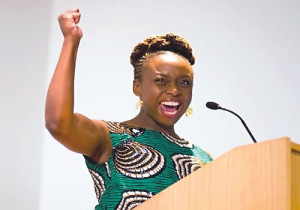We Should All Be Feminists by Chimamanda Ngozi Adichie
Written by Ashley Kelmore, Posted in Feminism, Reviews
Five Stars
This tiny little book contains more within its 50 pages that many longer tomes. It is simple and to the point. The title is not just a refrain; it’s an obvious statement of fact. Women should be feminists. Men should be feminists. We should all want the social, political and economic equality of the sexes.
This booklet is based off of a TEDx talk Ms. Adichie gave in 2012. You may have heard her previous talk about stories; if you haven’t, check it out online. I had heard great things about this one, and finally purchased it last week. Of course, if I were a 16-year-old student in Sweden, I would have already received it.
In such a short book she manages to address issues of culture, of normalizing men in positions of power. She also points out the ways in which gender inequality harms men. It’s not just a problem for us ladies; toxic masculinity and the pressures men face to ‘be manly’ are outcomes of gender inequality as well. In my favorite passage she smacks down those annoying comments calling for feminists to instead talk about human rights instead of gender rights. “Feminism is, of course, part of human rights in general – but to choose to use the vague expression human rights is to deny the specific and particular problem of gender.”
That actually got me thinking a bit about this political cycle in the U.S., and even more so when she speaks later about the need to also understand that class is an issue, but that even poor men still have privileges over women even if they do not also have wealth. I keep thinking about Bernie Sanders and what I’ve been seeing as his attempt to whittle everything down to class. There are intersections of which class is hugely important, but looking at class alone is totally insufficient to address the problems many people face. We need to look at racism. We need to look at sexism. And we need to look at class. I’m having a hard time being able to support him (in the primary) because I think he genuinely believes that if we fixed income inequality, all these other problems would disappear, and I just don’t agree.
Before I wrap this up, I do want to point out something. I know that there are many women that I would otherwise classify as feminists who hate the term because of its association with White Feminism™ and the type of privileged white women who ignore intersections of race and gender, and class and gender. And I totally get that. But I still think the premise Ms. Adichie shares holds: we should all (men and women alike) seek gender equality.

